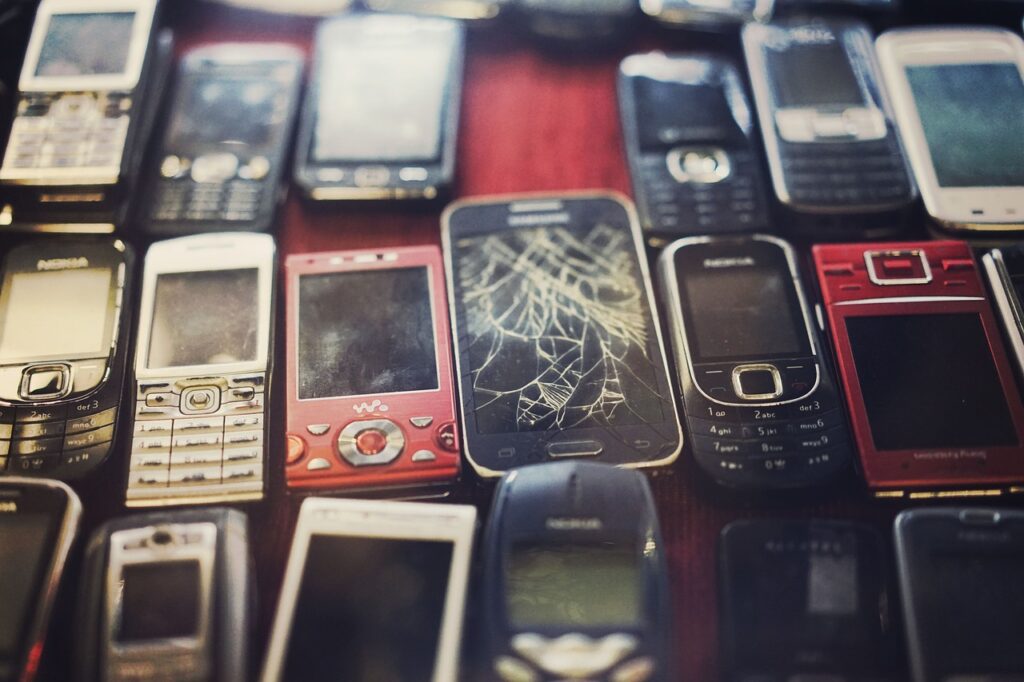January 9, 2023
The Smartphone Model Is Rotten: You Don’t Own Your Device
Let’s be clear, I’m not breaking any new ground here. The topic described by the heading has been talked about and analyzed a lot. And for good reason: The smartphone model – that is, the way smartphones are designed and sold – is rotten to the core. The subtitle might give you a hint why: You don’t really own the device you paid for and purchased.
What you own is the temporary, easily withdrawn right to operate the device for a short, undefined period of time.
Perhaps you’ve either realized this yourself or you’ve read about it elsewhere. As I said, I’m not breaking any new ground. Nonetheless, in this post I will share the… Kafkaesque experience I recently had with “my” smartphone – the model of which isn’t important; they’re all the same disaster.
At the same time, I will bring to your attention some menacing repercussions you might not have thought of, some news you might have not heard. Put simply, the… smartphone model of doing business is spilling over into other industries with potentially dystopian consequences.
How would you like not to own your car? Or, here’s a better one: How would you like the right to operate “your” car to be revoked if, say, you left a nasty review about the manufacturer?

Why the Smartphone Model Is Problematic: Operability and Ecology
As a programmer and overall someone who’s very comfortable with computers, I’m obsessed with customization: I want a device that looks and functions according to what I decide. I’m also a great fan of recycling and reusing things until their very last drop of operability.
As a result of the above, I fine-tune my computers in all sorts of ways. And if a computer gets too old, I certainly don’t throw it away. Rather, I install some lightweight Linux distro and keep using it.
The thing is, I can’t do this with smartphones. And it kills me.
To be fair, it’s sometimes possible to do it. Depending on the smartphone model, you might be able to root it – as the process of getting full access to certain processes is called – and thus customize it more efficiently. Moreover, again depending on the smartphone model, you might be able to reflash it – another fancy term referring to replacing the factory operating system (e.g. Android 12) with something else – for example the free and open-source LineageOS.
But the process can be – again, you guessed it, depending on the smartphone model – extremely complicated (way above the average user’s skills) or impossible altogether. In the case of “my” device, the latter was the case.
And that’s where my woes began.
Oops, What Happened to “My” Phone?
Some time ago, “my” phone received an update to Android 12. It worked alright, but I noticed some sluggishness. I decided to do a factory reset and start fresh. I went through the relevant option on the menu, cleared the warnings about all data being erased, and the phone rebooted.
What happened next?
I got a warning “No operating system found”, the phone entered an infinite boot loop, and eventually entered a so-called bricked state. When a phone is in such a state, it only reaches the bootloader, but no operating system can be loaded.
I was so shocked that I started laughing. It should be impossible for a phone to become bricked simply by doing a factory reset – through its very own menu!
To spare you the parenthetical details, what apparently happened is that the smartphone manufacturer, by pushing the update, introduced a fatal error. I discovered this searching online and seeing that there were countless other people who faced the same problem, in the exact same manner. Nonetheless, the reaction of the customer “support” was shocking in its own right. They basically said, oops, bummer; pay us and we’ll fix it. Yes, they wanted me to pay them to fix the error they caused.
Of course, out of principle alone, I wouldn’t do that. So I got a new phone and then began thinking what to do with the brick. And problems kept amassing.
If You Don’t Own “Your” Phone, What Happens to Critical Data?
For a while, I tried to see if there was any chance to reflash that particular model. Turns out, it’s designed in a way that only the manufacturer can do it. Not an advanced user, not a repair shop, nobody except the manufacturer.
So, I decided to recycle it.
Perfectly functioning phone (hardware-wise), just above two years old. For someone like me, who still uses a 2008 laptop, this is beyond disgusting. In any case, I needed to recycle it.
But then it dawned on me: Alright, what happens to the data? The device should be factory-reset – though since no newer data is written, the old data still persists. Moreover, the device is in such a hard-locked state that it should be impossible to retrieve data. Critical apps (e.g. password managers and banking apps) store their data in encrypted form, so they should be safe. And of course, the entire phone should have been encrypted.
Too much theory for someone as paranoid about digital security as I am.
I pried open the relevant compartment to remove the battery – because yes, the smartphone model of doing business doesn’t want you to even have easy access to the battery anymore – which I recycled separately, then I cut the motherboard of the phone to pieces. For good measure (just to show you how obsessed I am), I sprinkled some salted water on top of everything, to speed up oxidization. Then, I threw it all out.
Perfectly functioning device.

Why the Smartphone Model of “Ownership” Is Dangerous
And now that the… rant is over, let’s talk about the possible repercussions of allowing the smartphone model of operation to spill over into other fields.
First of all, the question we need to ask is whether there actually is such a possibility.
I’m afraid we’ve already gone beyond that. The (dystopian) future is here. You might have already read about Windows 11 and the criticism it has received in terms of privacy, ownership of data, etc. As this Cyber Security Herald article aptly puts it, “Windows is clearly becoming a bit too big brotherish with Windows 11”.
I mean, if I must link my device account with a Microsoft account, this effectively means Microsoft can theoretically lock me out of my own device, since its hard drive is encrypted.
Or let’s take another example: video games.
You paid $70 for a game. You’ve installed it on your computer – though is it “your” operating system? Heck, maybe you even bought is as a physical DVD. You still need to install a digital distribution service app (e.g. Steam or EA Games) that checks your right to use it. And if their servers are down or there is some other problem? Tough luck! The game you “own”, which you paid for with your own money, and which is single-player and has absolutely no need to connect to the internet to operate, cannot be played.
But it gets far, far more Orwellian.
Orwellian Dimensions
Let’s take a look at this deceptively innocent announcement:
BMW is now selling subscriptions for heated seats in a number of countries — the latest example of the company’s adoption of microtransactions for high-end car features.
A monthly subscription to heat your BMW’s front seats costs roughly $18, with options to subscribe for a year ($180), three years ($300), or pay for “unlimited” access for $415.
Just as with Windows, you might not see anything particular wrong with it. “Oh, well, isn’t that good?” a well-meaning individual might observe. “This way you pay less”.
The Orwellian Possibilities of the Smartphone Model
The smartphone model for cars means, of course, you don’t own “your” car.
By the way this is already the case, to some extent. I personally don’t own a car, I prefer to use public transport. But the last time I used a car, I could open the hood and take a good look at the various parts. If I knew anything about cars (which I don’t), I would be able to fine-tune and fix things, as many others do. Such people also tell me, it’s increasingly harder to do this with modern cars. Apart from an oil change (if even), everything else requires the manufacturer (or an approved repair shop) to fix.
The crucial difference of having a smartphone model for cars would of course be the scope. Whereas now you can’t fix your car even if you knew how, a smartphone model type of subscription-based services would affect operability itself.
Here are some fanciful examples I pulled out of my tin-foil hat:
- If I break the terms of service – in a way car manufacturer A interprets, say, by running a red light or, more conspiratorially, leaving a bad review that affects their business – do they reserve the right to suspend my subscription for heated seats?
- Let’s get even more dastardly: Do they reserve the right to suspend my subscription for starting the engine?
- I am a farmer and I bought a subscription-based tractor from manufacturer J, which has a synergy deal with seed supplier M. If I break the terms of service with M, does J reserve the right to suspend my subscription?
- If I am a professional using a van from manufacturer T, and for an irrelevant reason I am in the middle of a trial, does T reserve the right to suspend my right to use the van pending the results of the judicial process?
Most of the above will likely sound far-fetched. I’m certainly not the conspiratorial type. However, I’m also a literature expert, with experience in science-fiction narratives. I know dystopian possibilities when I see them.
What Do We Do?
That’s not up to me to answer. I only pose the questions. But posing the right questions is a huge part of getting valuable answers. So, we need to pose the right questions, and “what do we do?” isn’t the first question we need to answer.
Rather, we should begin by answering another question: What do we want to do?
We live in a capitalist framework; we’re all accomplices. As Slavoj Žižek delightfully explains, sometimes Heaven will show you Hell simply as a way of keeping you in line. In other words, we are pushed to buy increasingly less operable devices, to work in increasingly less meaningful jobs, to put up with increasingly more mediocrity, conformity, and corruption, simply because we are shown that it could be much worse.
Are we fine with (temporarily and conditionally) using smartphones without owning them?
Do we not really mind about being locked out of our computer?
Finally, do we accept kinda-owning cars (in a sense: owning the illusion of owning a car) in return for cheaper prices?
If so, we don’t need to do anything. Let’s fantasize about heroes making it all right one day, some way.
As Cornelius Castoriadis has said, referring to Thucydides: We can be free or we can be content, but being both is impossible.
I don't show you ads, newsletter pop-ups, or buttons for disgusting social media; everything is offered for free. Wanna help support a human internet?
(If you'd like to see what exactly you're supporting, read my creative manifesto).
